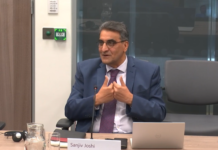Britain’s biggest charities are grabbing an increasing share of funding and freezing out their smaller counterparts, according to a major new report.
Since the Covid pandemic of 2020-2022, the cash divide between the Davids and the Goliaths of the voluntary world has widened markedly, with the big charities up by £4.5 billion while their smaller brethren have suffered revenue falls of £4.6 billion.
Public money is driving the income gulf with big charities unfairly dominating contracts awarded by the Government and its agencies, according to the report, Overlooked and Underfunded, from the CSJ Foundation.
It finds that 85 per cent of all charitable income in England and Wales goes to just 4 per cent of registered charities (the biggest, national charities). The 16 largest charities – which include the likes of Save the Children, the National Trust and Cancer Research UK – have more money than the combined income of more than 160,000 charities with revenues under £1 million.
At the same time, funding is being diverted away from the vital work of grassroots organisations, despite over a quarter of Covid grants and contracts being awarded to small charities.
The report quotes evidence from local charities, including a Midlands-based organisation, which told the CSJ Foundation:
“National charities apply for local contracts, thinking they’ve spotted the golden egg and a chance to get more income. They often end up getting the contract, putting local organisations at risk or even forcing the closure of small local organisations and then hand their contracts back, as they discover they cannot deliver the contract after all. They simply don’t have the knowledge of the community or the knowledge of the constraints of local delivery. Then, to maintain services local charities are asked by the LA to step into the gap the national charity has left; but at what cost?”
These smaller charities, often overlooked by national media, account for 97 per cent of charity closures in the last 10 years. The public are highly concerned about this trend. A poll conducted by Whitestone Insight for the CSJ Foundation shows that 79 per cent of UK adults believe that small, local, charities seem to be often overlooked and under-resourced.
The report argues that this could not come at a worse time. Small and medium charities are struggling with increased local need following the pandemic. It is clear that “post-pandemic the need from communities for effective poverty-fighting grassroots organisations continues to rise, but funding and other opportunities are not increasing to meet this demand”, the report says.
Average spending by small charities has risen by almost 12 per cent since the pandemic, but their incomes have only risen by around three per cent. A situation the report describes as “unsustainable”.
The public is increasingly sceptical of the benefit of national charities compared to small grassroots organisations. According to the poll, only 20 per cent of UK adults trust large national charities over small, grassroots charities and 76 per cent of people say that local groups know their communities better than larger, national, charities.
Most people also think that the Government’s national policies would improve if it listened more to grassroots charities.
There is a great deal of concern that money is wasted at larger charities, with almost three quarters of adults (74 per cent) concerned that too much of the money donated to charities is spent on administration rather than delivering vital services.
The report sets out four ways forward for the next Government to save local charity initiatives:
- Give due consideration to grassroots organisations (such as small and medium-sized charities), when making contracting decisions across all departments which award funding to charitable organisations.
- Reserve a proportion of government grant-making for grassroots charitable organisations, such as those classified as small and medium-sized.
- Bolster private charitable investment match-funding initiatives, where private philanthropy towards grassroots smaller charities can be encouraged. Building on the DCMS Community Match Fund initiative, rolled out during the pandemic.
- Give equal voice to smaller charities as larger charities when government seeks to engage the sector in fact-finding activities, roundtable discussions, and evidence gathering for policy making.
Nathan Gamester, CSJ Foundation Managing Director, said:
“Small charities are being overlooked and many are at breaking point. They face a crisis of funding because the system is geared towards the big, national charities who hoover up public contacts and grants.”
“When grassroots charities suffer, so do the people and communities they serve. Income into big charities is increasing while income to small charities is decreasing – at a time when demand for services is rising significantly. This is unsustainable and very worrying.
“Many national charities do good work. Yet, they are growing at the expense of vital local charities. Simply throwing more money, untargeted, into the charity sector will not help those most in need, as the system clearly favours large ‘blue chip’ charities. It is small, grassroots charities embedded in communities who need further support.
“The public know the value of their local charities and are right to be worried that larger, potentially out-of-touch national groups are taking resources that would be better delivered locally.”
Help keep news FREE for our readers
Supporting your local community newspaper/online news outlet is crucial now more than ever. If you believe in independent journalism, then consider making a valuable contribution by making a one-time or monthly donation. We operate in rural areas where providing unbiased news can be challenging. Read More About Supporting The West Wales Chronicle

























